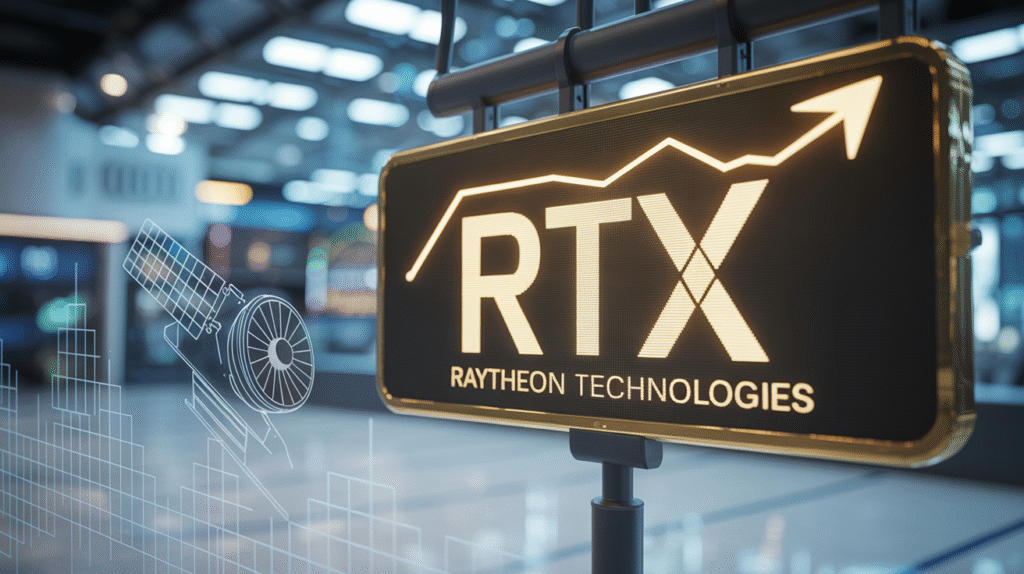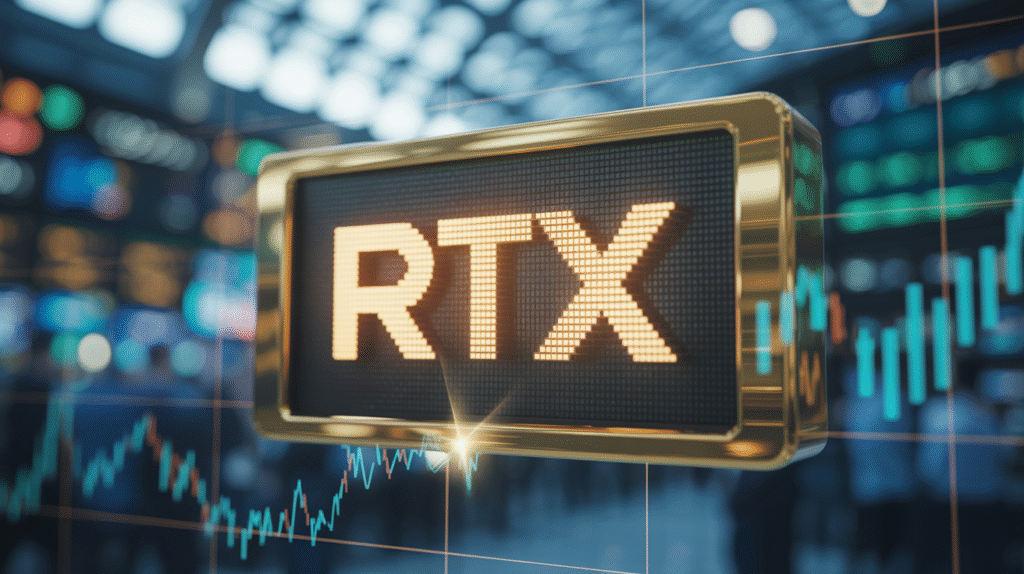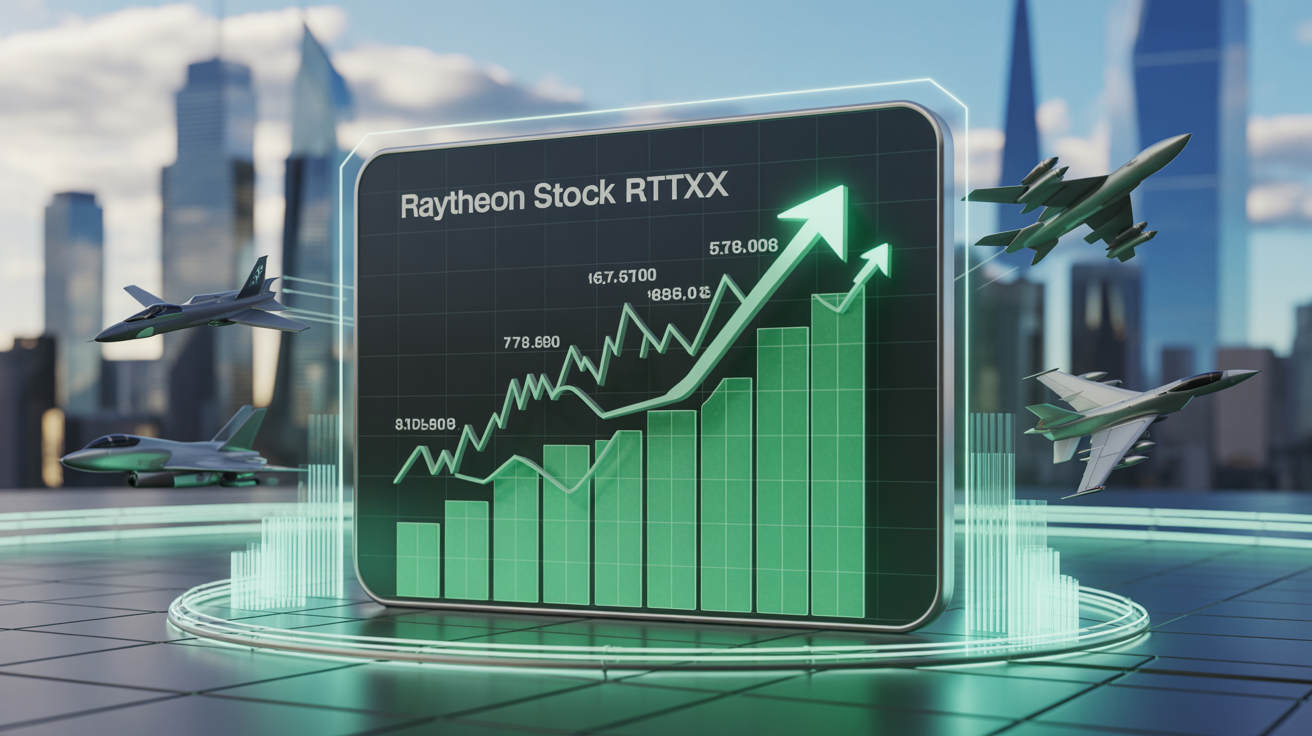Introduction to Raytheon Stock
Raytheon stock, traded under the ticker symbol RTX, stands tall in the aerospace and defense industry. It’s a go-to for investors seeking stability and growth. With segments like Pratt & Whitney and Collins Aerospace, Raytheon stock blends military strength with commercial aerospace gains. Rising geopolitical tensions and defense contracts drive its stock price. Plus, its dividend yield offers steady returns. This article breaks down Raytheon’s stock history, performance, and opportunities, making it easy to understand why it’s a favorite among investors in the stock market. Dive in to see if Raytheon stock fits your portfolio.
The Origins of Raytheon Stock
Raytheon’s stock roots date back to RTX Corporation, which was formed in 2020 through the merger of Raytheon Company and United Technologies. It created a giant in the aerospace and defense industries. Raytheon brought expertise in missile defense, while United Technologies added aviation prowess. Consequently, Raytheon stock reflects a balanced portfolio. The merger boosted revenue growth, with RTX’s market capitalization hitting $230 billion in 2025. Moreover, Raytheon stock builds on a legacy of Raytheon innovations, like radar systems and hypersonic missiles. This history makes Raytheon stock a reliable choice for investors eyeing the aerospace sector for long-term growth.
Raytheon Stock’s Performance in 2025
Raytheon stock has soared in 2025, climbing 32% year-to-date. It peaked at $152.45 in June, outshining the S&P 500’s 2.5% gain. Despite occasional dips, Raytheon stock boasts a monthly trading volume of $1.2 billion, indicating strong investor sentiment. However, stock volatility lingers due to geopolitical tensions. With a Zacks ranking in the top 20% of industries, Raytheon stock proves its mettle. Analysts highlight its stock performance, driven by defense contracts. Investors closely watch Raytheon stock, as it sets a high standard in the stock market for stability and growth.
Why Raytheon Stock Offers Dividend Appeal
Raytheon stock shines with a dividend yield of 1.7%, earning Dividend Aristocrat status for over 25 years of steady dividend increases. In Q2 2025, RTX paid $950 million to shareholders, a boon for income seekers. This payout, backed by a $225 billion backlog, signals financial strength. However, economic factors such as inflation could pressure dividend yields. Still, Raytheon’s consistent dividend payments enhance the resilience of its portfolio. Investors love this reliability in the defense industry. By holding Raytheon stock, you secure steady income alongside growth potential, making it a smart pick for balanced portfolios in the stock market.
Earnings Per Share and Raytheon Stock Growth
Raytheon stock thrives on strong earnings per share (EPS). In Q2 2025, RTX reported an adjusted EPS of $1.52, up 13% from 2024. Analysts predict a Q3 EPS of $1.50, a 4% rise. For 2025, estimates hit $6.10, up 5.5%. It fuels optimism regarding Raytheon’s valuation metrics. Additionally, RTX’s 11% average earnings beat over four quarters shows reliability. Despite supply chain hurdles, Raytheon stock’s EPS growth supports its stock price. Investors track these numbers as they highlight RTX’s edge in the aerospace sector, making Raytheon stock a compelling investment choice.
Defense Contracts Powering Raytheon Stock
Raytheon stock rides high on defense contracts. In 2025, RTX landed a $350 million missile deal and a $750 million radar contract, boosting its $110 billion defense backlog. For example, Raytheon’s hypersonic missiles strengthen its global reach. Moreover, Pentagon contracts drive revenue growth, with global defense spending set to grow 6.7% annually through 2030. However, industry competition from Lockheed Martin poses challenges. Still, Raytheon stock benefits from steady demand, positioning it as a leader in the defense industry. Investors view Raytheon stock as a stable investment driven by its role in national security.

Commercial Aerospace Boosts Raytheon Stock
Raytheon stock gains traction from the commercial aerospace sector. RTX’s Pratt & Whitney and Collins Aerospace segments saw 16% and 10% sales growth in Q2 2025. Surging air travel fuels aftermarket demand, boosting Raytheon’s stock revenue. For instance, Collins Aerospace reported 11% organic growth in avionics. However, supply chain issues raise costs.
Nevertheless, Raytheon’s stock has a dual focus on defense and commercial markets, ensuring portfolio resilience. As aviation rebounds, Raytheon stock capitalizes on this trend. Investors view Raytheon stock as a diversified powerhouse, blending stability with growth in the aerospace sector.
What Analysts Say About Raytheon Stock
Analyst ratings boost Raytheon stock’s appeal. In 2025, JPMorgan raised its price target to $165, keeping a Buy rating. Similarly, Citi set a $162 target, citing Pratt & Whitney’s strength. However, Wells Fargo holds a $148 target with a Hold rating. Overall, 19 of 23 analysts rate Raytheon stock as “Buy” or “Overweight,” with a $165 average target, implying a 16% upside. Yet, Raytheon stock’s P/E ratio of 25.5 exceeds the industry’s 24.2, suggesting a premium. Investors weigh these ratings, balancing Raytheon’s stock growth against its costs.
Geopolitical Tensions and Raytheon Stock
Geopolitical tensions propel Raytheon stock. In 2025, Middle East conflicts sparked a 5% rally in RTX shares, per X posts. Demand for missile defense systems like Patriot surged, boosting Raytheon stock. These tensions highlight its strategic value—however, stock volatility spikes with global unrest. For instance, losing a hypersonic missile contract could dent revenue. Still, Raytheon’s stock benefits from its Pentagon contracts, providing stability. As conflicts continue, Raytheon stock remains a defensive asset. Investors see it as a hedge against uncertainty, reinforcing its role in the stock market amid global challenges.
Raytheon Innovations Driving Raytheon Stock
Raytheon stock benefits from Raytheon innovations. In 2025, RTX delivered advanced SPY-8 radars and secured a $1.3 billion counter-drone deal. These advancements bolster RTX’s $225 billion backlog, driving growth in Raytheon’s stock. Additionally, hypersonic missile developments enhance RTX’s edge. However, industry competition from Boeing poses a challenge to market share.
Nevertheless, RTX’s $2.7 billion R&D investment fuels the potential of Raytheon stock. These innovations position Raytheon stock for future gains. Investors view them as key drivers, making Raytheon stock a dynamic choice in the defense industry, where cutting-edge technology is a key factor in shaping market leadership.
Challenges Facing Raytheon Stock
Raytheon stock encounters obstacles that test its strength. Supply chain disruptions, like chip shortages, raise costs, impacting margins. In 2025, RTX flagged a $950 million tariff hit. Additionally, industry competition from Northrop Grumman puts pressure on Raytheon’s stock share. Moreover, insider trading—executive sell-offs in Q2—raises eyebrows despite institutional buys. However, Raytheon stock’s $225 billion backlog offers a buffer. Investors must balance these risks against the strengths of Raytheon stock. Monitoring economic factors, such as tariffs, is crucial for assessing its path. Despite challenges, Raytheon stock remains a resilient player in the aerospace sector.

Institutional Investors Backing Raytheon Stock
Institutional investors strongly support Raytheon stock, signaling confidence. In Q2 2025, 1,450 institutions, including State Street and Fidelity, added $1.5 billion in RTX shares. It mitigates concerns about insider trading in executive sales. Moreover, Raytheon’s S&P 500 status attracts investment funds. Institutional ownership stabilizes Raytheon stock’s stock price, reflecting trust in backlog growth. However, stock volatility from geopolitical tensions demands caution. For investors, Raytheon stock’s institutional backing highlights its long-term investment potential. This support makes Raytheon stock a cornerstone for portfolios targeting the defense industry and aerospace sector.
Valuation Metrics for Raytheon Stock
Raytheon stock’s valuation metrics guide investment choices. Its forward P/E ratio of 25.5 exceeds the industry’s 24.2, indicating a premium. The PEG ratio of 2.8, above the aerospace sector’s 2.2, suggests slower growth relative to price. However, RTX’s EV/EBITDA of 16.5x is 31% below the industry median, hinting at value. Analysts project a $165–$195 target, implying 16–30% upside for Raytheon stock. Yet, economic factors like tariffs could pressure valuations. Investors analyze these metrics to gauge Raytheon’s stock balance of growth and cost in the market.
Merger News Impacting Raytheon Stock
Raytheon stock has been shaped by merger news. The 2020 merger of Raytheon and United Technologies formed RTX, diversifying revenue. In 2025, RTX’s $2.2 billion sale of Collins Aerospace’s propulsion unit to Eaton cleared regulatory hurdles, sharpening focus. These moves are expected to bolster Raytheon’s stock growth. However, antitrust scrutiny could slow future deals. Still, Raytheon stock benefits from RTX’s streamlined operations. Investors view these shifts as enhancing Raytheon’s long-term investment potential. By refining its portfolio, RTX ensures Raytheon stock stays competitive in the defense industry, appealing to growth-focused investors.
Quarterly Results and Raytheon Stock
Raytheon stock reacts to RTX’s quarterly results. In Q2 2025, RTX reported 10% organic sales growth, with Pratt & Whitney up 16%. Raytheon’s sales rose 4% organically, despite a 3% adjusted dip. Free cash flow hit $900 million, supporting dividends. However, tariff risks pressured Raytheon stock’s stock price. Analysts expect Q3 revenue of $21.5 billion, up 5.5%. The $225 billion backlog ensures future gains. Investors track these results as they demonstrate Raytheon stock’s ability to manage supply chain issues. Strong performance reinforces Raytheon’s stock as a reliable investment.
Stock Forecasts for Raytheon Stock
Raytheon stock forecasts remain upbeat. Analysts predict 2025 earnings of $6.10 per share and $86 billion in revenue, up 5.5% and 4.8%. Price targets range from $150 to $195, with a $165 consensus suggesting a 16% upside. Moreover, Raytheon’s stock has a 9.7% long-term earnings growth rate, fueling optimism; however, economic factors, such as tariffs, temper the outlook. For instance, losing a hypersonic missile bid could slow growth. Still, Raytheon stock’s $110 billion defense backlog offers stability. Investors weigh these forecasts, balancing the potential of Raytheon stock against the risks in the aerospace sector.
Portfolio Resilience with Raytheon Stock
Raytheon stock strengthens portfolio resilience in volatile markets. Its mix of missile defense and commercial aerospace balances risks. For example, Pentagon contracts ensure steady revenue, while Collins Aerospace’s growth adds flexibility. Additionally, Raytheon stock’s dividend yield provides income stability. However, stock volatility from geopolitical tensions requires caution. With a Zacks ranking in the top 20%, Raytheon stock appeals to conservative investors. Its resilience makes Raytheon stock a smart choice for diversification. By holding Raytheon stock, you gain exposure to a leader in the defense industry, balancing risk and reward in your portfolio.
Long-Term Investment Value of Raytheon Stock
Raytheon stock is a strong long-term investment. Over the past five years, it has gained 130%, with a 9,800% return since its inception. Its dividend aristocratic status and 1.7% yield attract income investors. Moreover, a $225 billion backlog and global defense spending growth of 6.7% annually are expected to ensure revenue. However, supply chain challenges persist. Still, the segments of Raytheon stock—Collins Aerospace, Pratt & Whitney, and Raytheon—offer stability. With analyst targets up to $195, Raytheon stock promises 25–30% upside. Investors find Raytheon stock a reliable choice for growth and income in the aerospace sector.
Industry Competition and Raytheon Stock
Raytheon stock faces tough industry competition. Rivals like Lockheed Martin and Boeing compete for Pentagon contracts, like hypersonic missile deals. Losing bids could impact RTX’s revenue. Additionally, Airbus challenges Raytheon’s dominance in the commercial aerospace sector. However, RTX’s aftermarket focus gives it an edge. Moreover, Raytheon’s innovations in radars and drones strengthen its position. With a $225 billion backlog, Raytheon stock holds firm. Investors monitor competition, as it affects stock performance. Despite its rivals, Raytheon’s diversified portfolio ensures leadership in the defense industry, making it a resilient investment choice.
Conclusion: Invest in Raytheon Stock Now
These stock offers a winning mix of growth and stability. RTX’s dominance in aerospace and defense, fueled by defense contracts and commercial aerospace, drives the appeal of these stock. Its dividend yield and backlog growth ensure portfolio resilience despite supply chain risks. With analyst targets up to $195, Raytheon stock promises strong returns. Don’t miss out—research Raytheon stock, talk to your advisor, and consider adding it to your portfolio. Act today to seize Raytheon stock’s potential in shaping the future of the defense industry. Invest now for a secure and prosperous tomorrow.
References
- Bloomberg. (2025). RTX Corporation: Q2 2025 Earnings and Outlook. Retrieved from https://www.bloomberg.com
- Investor’s Business Daily. (2025). Raytheon Stock Surges on Defense Contract Wins. Retrieved from https://www.investors.com
- Defense One. (2025). RTX Secures $750M Radar Contract for Navy. Retrieved from https://www.defenseone.com
- Forbes. (2025). Why RTX Remains a Top Pick for Investors. Retrieved from https://www.forbes.com
- The Motley Fool. (2025). Raytheon Stock: A Deep Dive into Its 2025 Potential. Retrieved from https://www.fool.com
